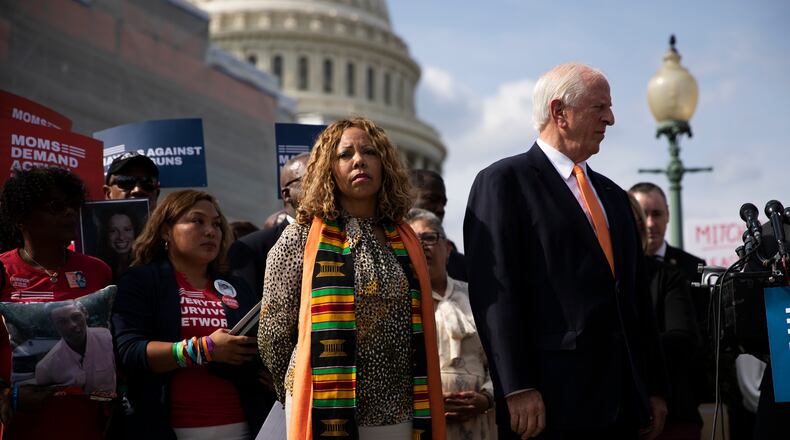Georgia's congressional delegation is deeply divided on how to tackle the kinds of mass shootings that shook the nation last month.
Many local lawmakers returned from the August recess this week seemingly hardened in their pre-existing beliefs on whether and how to limit access to guns, reflecting the deep mistrust that’s emanated from their party leadership even after tragedies in Dayton and El Paso offered a sliver of hope that bipartisan agreement was possible.
The narrowing window for compromise was evident on Tuesday afternoon, when House Democrats decided to move ahead on three gun control measures without GOP buy-in and President Donald Trump huddled with Republican leaders in the White House.
Several Georgia Democrats said August’s twin shootings represented a wake-up call for Congress to tighten gun control laws and vowed to push on even as Trump offered mixed signals about what he would be willing to sign.
"Too often we are told that we must accept these tragedies. We're told that instead of changing our laws we must have more lockdown drills, more security guards, more bullet-proof glass and more vigils for those we have lost," said U.S. Rep. Lucy McBath, D-Marietta, a freshman who became a gun control activist after her teenage son was fatally shot in 2012. "Inaction is absolutely unacceptable."
McBath is a member of the House Judiciary Committee, the panel that cleared a trio of gun control bills late Tuesday. Among them was a federal “red flag” proposal that would incentivize states to allow judges to order the temporary seizure of weapons from people deemed dangerous to themselves or others, which supporters say could have prevented some recent mass shootings.
While some Republicans had initially appeared open to such legislation after last month’s events in El Paso, they rejected Tuesday’s version as they waited for word from Trump.
Gainesville Congressman Doug Collins led the opposition as the top Republican on the Judiciary Committee.
"What I'm not willing to do is support legislation that will not do anything to make us safer and simultaneously infringes on the rights and liberties guaranteed by our Constitution,” he said, warning that the “red flag” bill could infringe on due process by allowing guns to be confiscated “without notice or an opportunity to be heard” for people who are targeted.
Georgia Republicans instead voiced support for more tailored alternatives as they waited for Trump to announce his position on broader gun fights.
Collins recirculated information about his bill that seeks to make it easier for law enforcement to share information about violent threats, which he argues would spur the kind of coordination that could have prevented other mass shootings.
Tifton Republican Austin Scott, who represents a largely rural district in south-central Georgia, said he was open to upping the minimum age for purchasing certain classes of semi-automatic weapons. Scott said he was also eyeing legislation to close the "Charleston loophole" in the background check system that currently allows some gun dealers to transfer firearms before the FBI completes required background checks. (The bill is co-sponsored by the retiring Rob Woodall, R-Lawrenceville.)
“I think people are open to having an honest discussion on policy,” Scott said of Republicans. “What we’re not open to is continuing the kangaroo games that have been played by the Democratic leadership. And quite honestly I don’t expect Speaker (Nancy) Pelosi will be willing to put a bill on the floor that President Trump will sign on guns or anything else.”
Democrats indicated they had similar misgivings about the right.
Lithonia Democrat Hank Johnson said Republicans, including Trump, are “simply not operating in good faith” on firearms.
Even if Democrats were to offer more middle-of-the-road gun control proposals, he said, “Republicans are either going to try and water them down even more or oppose them altogether.” Johnson wants Congress to ban the sale and manufacture of assault weapons, constrain high-capacity magazines and expand background checks.
“It’s not just the occasional mass killings that are done by assault weapons that has my constituents so concerned about gun reform,” he said. “It is every day, night-by-night crime with firearms causing the deaths of our young people.”
The state's House delegation voted along party lines earlier this year to advance a bill that would expand background checks for the sale and transfer of firearms. It so far has languished on the Senate's doorstep.
Georgia U.S. Sen. David Perdue, who is running for re-election next year, previously expressed deep reservations about "red flag" bills, even as his Democratic opponents have pushed for sweeping gun control proposals.
The Georgia Republican who has shown the most willingness to compromise in recent days has been U.S. Sen. Johnny Isakson, who is retiring at the end of the year. Isakson said Monday he wouldn't rule out any potential solutions but said he'd like to see what Trump and Senate Majority Leader Mitch McConnell are open to accepting first.
“I want to support a solution,” he said.
Read more: The gun rights debate in Georgia intensifies with 2020 nearing
About the Author
Keep Reading
The Latest
Featured




